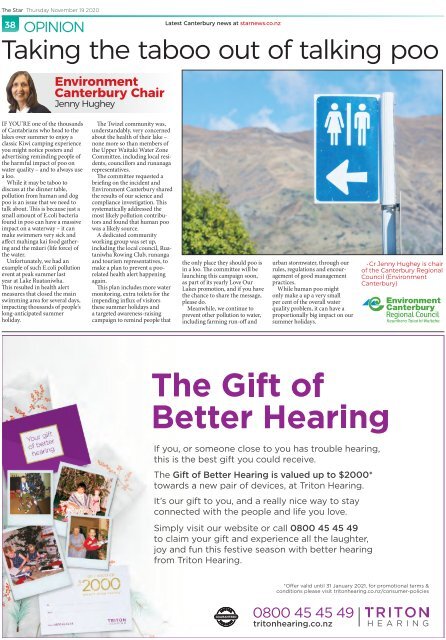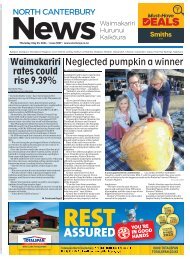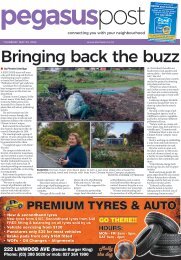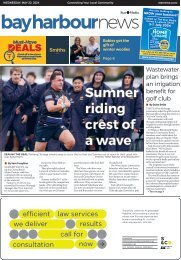The Star: November 19, 2020
You also want an ePaper? Increase the reach of your titles
YUMPU automatically turns print PDFs into web optimized ePapers that Google loves.
<strong>The</strong> <strong>Star</strong> Thursday <strong>November</strong> <strong>19</strong> <strong>2020</strong><br />
38<br />
OPINION<br />
and enhance that work.<br />
IF YOU’RE That work one included of the setting thousands<br />
of up Cantabrians a climate-change who head integration to the<br />
lakes programme over summer in the Long-term to enjoy a Plan<br />
classic 2018-28, Kiwi ensuring camping climate experience change<br />
you was might actively notice considered posters across and<br />
advertising workstreams, reminding increasing people visibility of<br />
the of harmful the science impact and what of poo we on know<br />
water about quality the impact – and of to climate always use<br />
a change loo. on Canterbury, and liaising<br />
on While the issue it may with be iwi taboo and to regional<br />
discuss partners, at other dinner local authorities table,<br />
pollution and central from government. human and dog<br />
poo As is an organisation, issue that we we need have to<br />
talk also about. made This significant is because progress just in a<br />
small addressing amount our of own E.coli greenhousegas<br />
emissions, in poo can with have our a massive<br />
bacteria<br />
found<br />
impact Christchurch on a waterway building – receiving it can a<br />
make “market-leading” swimmers very energy sick efficiency and<br />
affect rating mahinga of 5.0 out kai of food 6 in the gathering<br />
to and February the māuri on the (life National force) of<br />
year<br />
the Australian water. Built Environment<br />
Rating<br />
Unfortunately,<br />
System New<br />
we<br />
Zealand.<br />
had an<br />
example<br />
<strong>The</strong> building’s<br />
of such E.coli<br />
features<br />
pollution<br />
include<br />
184 solar panels which can<br />
event at peak summer last<br />
generate more than 55,000<br />
year at Lake Ruataniwha.<br />
kilowatt hours of electricity per<br />
This resulted in health alert<br />
year.<br />
measures<br />
<strong>The</strong>re has<br />
that<br />
been<br />
closed<br />
a 26%<br />
the<br />
reduction<br />
main<br />
swimming<br />
per staff member<br />
area for<br />
in<br />
several<br />
emissions<br />
days,<br />
impacting since 30 June thousands 2010. We of now people’s have<br />
long-anticipated access to electric summer and hybrid<br />
holiday. vehicles and hope to have half our<br />
fleet hybrid or long-range electric<br />
by <strong>The</strong> 2022. Twizel Carbon community emissions was, from<br />
understandably, air travel across the very organisation concerned<br />
about are offset the via health our own of their biodiversity lake –<br />
none programmes. more so than members of<br />
the According Upper Waitaki to a Madworld Water Zone report<br />
Committee, in 20<strong>19</strong>, our gross including emissions local were residents,<br />
2253 tonnes councillors of carbon and dioxide runanaga<br />
representatives.<br />
(CO2) equivalent, compared with<br />
removals <strong>The</strong> committee of 7883 tonnes requested of CO2- a<br />
briefing equivalent on through the incident our efficiency and<br />
Environment efforts and from Canterbury forestry planting shared<br />
the across results 2700 of hectares. our science and<br />
compliance <strong>The</strong> changing investigation. climate will This pose<br />
systematically many risks to life addressed and livelihood the<br />
most in Canterbury. likely pollution In recent contributors<br />
we have and seen found how that occasional, human poo<br />
years<br />
was but extreme, a likely source. weather events have<br />
had A dedicated huge effects community on residents and<br />
working infrastructure group around was set the up, South<br />
including Island. the local council, Ruataniwha<br />
<strong>The</strong> driest Rowing parts Club, of our runanga region,<br />
and<br />
along<br />
tourism<br />
the Marlborough<br />
representatives,<br />
coast and<br />
to<br />
make<br />
across<br />
a<br />
much<br />
plan to<br />
of the<br />
prevent<br />
Canterbury<br />
a poorelated<br />
health alert happening<br />
Plains, are expected to get even<br />
drier. North-westerly storms are<br />
again.<br />
predicted to become more intense,<br />
with<br />
This<br />
torrential<br />
plan includes<br />
alpine<br />
more<br />
rainstorms<br />
water<br />
monitoring,<br />
turning our braided<br />
extra toilets<br />
rivers<br />
for<br />
into<br />
the<br />
impending influx of visitors<br />
these roaring summer rapids, holidays fuelling landslides<br />
and causing widespread and erosion.<br />
a targeted Canterbury’s awareness-raising<br />
coastal<br />
campaign communities to remind will be threatened people that<br />
Latest Canterbury news at starnews.co.nz<br />
since Environment Canterbury<br />
climate-change emergency<br />
Taking the taboo out of talking poo<br />
Environment<br />
Canterbury Chair<br />
Jenny Hughey<br />
by sea-level rise this century and<br />
our productive and protected land<br />
jeopardised by the arrival and<br />
spread of new, exotic weeds and<br />
pests from warmer climates.<br />
All these eventualities have<br />
to be planned and prepared for,<br />
and Environment Canterbury<br />
will remain in the vanguard of<br />
these climate change efforts.<br />
One example is the $40 million<br />
Waimakariri River flood<br />
protection project, completed<br />
late last year. <strong>The</strong> network of<br />
floodgates and stopbanks will<br />
protect half a million people and<br />
$8 billion of community and<br />
business assets from a possible<br />
“super flood”.<br />
<strong>The</strong> last major flood was in<br />
December <strong>19</strong>57, when parts<br />
of Coutts Island in Belfast and<br />
Kainga were swamped by river<br />
flow peaking at 3990 cubic<br />
metres per second (cumecs).<br />
<strong>The</strong> protection scheme has been<br />
designed to defend Christchurch<br />
from a flood of as much as 6500<br />
cumecs.<br />
Environment Canterbury’s<br />
leadership of biodiversity and<br />
the only place they should poo is<br />
biosecurity programmes is also<br />
underpinned<br />
in a loo. <strong>The</strong><br />
by<br />
committee<br />
climate-change<br />
will be<br />
concerns.<br />
launching this campaign soon,<br />
as Canterbury’s part of its yearly distinct Love braided Our<br />
rivers Lakes and promotion, unique wetlands if you face have<br />
many the chance challenges. to share <strong>The</strong> the rivers message, form<br />
a please vital do.<br />
Meanwhile, ecological we link continue and provide<br />
an abundant food supply and to<br />
nesting prevent grounds other pollution for 26 species to water, of<br />
native including birds farming – most classified run-off and as<br />
threatened and facing increased<br />
pressures due to river system<br />
change.<br />
Wetlands are also ecosystems<br />
at-risk nationally and regionally,<br />
degraded by draining, damming<br />
and diversion affecting their<br />
ability to sequester carbon,<br />
cleanse freshwater and mitigate<br />
flooding, as well as impacting on<br />
biodiversity and mahinga kai.<br />
With biosecurity, we are<br />
putting greater emphasis on the<br />
risks of new pests establishing<br />
in Canterbury. Warming<br />
temperatures, changing soils and<br />
new land uses mean new weeds<br />
especially, will be able to gain a<br />
better foothold across the region.<br />
More broadly, we have to<br />
curb reliance on fossil fuels and<br />
find environmentally suitable<br />
alternatives, such as electricity and<br />
hydrogen, to power our public<br />
transport.<br />
When my predecessor Steve<br />
Lowndes retired as chair of<br />
this council late last year, he<br />
highlighted some of the big<br />
changes on the way. He was<br />
optimistic we would be able to<br />
urban stormwater, through our<br />
deal with the “pressing issues” of<br />
climate<br />
rules,<br />
change<br />
regulations<br />
and sustainability.<br />
and encouragement<br />
I share his of confidence. good management As a<br />
community, practices. and as a council,<br />
we are While taking human some poo bold might steps to<br />
ensure only make we are a in up a better a very place small to<br />
cope per cent of the overall water<br />
quality with problem, the changing it can climate<br />
and the tests it will set us. But have a<br />
there proportionally will always be big a impact need to on do our<br />
more. summer holidays.<br />
It’s a year since Environment Canterbury<br />
declared a climate-change emergency<br />
JENNY HUGHEY explains what<br />
the council has been doing.<br />
<strong>The</strong> formal declaration of a<br />
state of climate emergency across<br />
Canterbury was one of the most<br />
serious, and colourful, moments<br />
in the regional council’s more than<br />
30-year history.<br />
A year ago this Saturday,<br />
at 11.49am, Environment<br />
Canterbury became New Zealand’s<br />
first council to proclaim such an<br />
emergency, formally dedicating<br />
itself to consideration of climate<br />
change at the heart of all it does.<br />
<strong>The</strong> declaration highlighted<br />
that all the work Environment<br />
Canterbury does – from<br />
freshwater management to<br />
biodiversity and biosecurity,<br />
transport and urban development<br />
to air quality, and also regional<br />
leadership – has a climate change<br />
focus.<br />
Currently, under the Resource<br />
Management Act, regional<br />
councils are required only to adapt<br />
to climate change, not mitigate<br />
it – that responsibility is the<br />
Government’s, but could change.<br />
Even in ‘adapt mode’ many<br />
of Environment Canterbury’s<br />
existing policies and plans already<br />
contribute to reduced emissions.<br />
In declaring the climate<br />
emergency, the Council noted it<br />
would continue to show leadership<br />
on climate-change and do so<br />
without adding new programmes<br />
at ratepayers’ expense. It also gave<br />
staff a clear mandate to continue<br />
and enhance that work.<br />
That work included setting<br />
up a climate-change integration<br />
programme in the Long-term Plan<br />
2018-28, ensuring climate change<br />
was actively considered across<br />
workstreams, increasing visibility<br />
of the science and what we know<br />
about the impact of climate<br />
change on Canterbury, and liaising<br />
on the issue with iwi and regional<br />
partners, other local authorities<br />
and central government.<br />
As an organisation, we have<br />
also made significant progress in<br />
addressing our own greenhousegas<br />
emissions, with our<br />
Christchurch building receiving a<br />
“market-leading” energy efficiency<br />
rating of 5.0 out of 6 in the year<br />
to February on the National<br />
Australian Built Environment<br />
Rating System New Zealand.<br />
<strong>The</strong> building’s features include<br />
184 solar panels which can<br />
generate more than 55,000<br />
kilowatt hours of electricity per<br />
year.<br />
<strong>The</strong>re has been a 26% reduction<br />
per staff member in emissions<br />
since 30 June 2010. We now have<br />
access to electric and hybrid<br />
vehicles and hope to have half our<br />
Environment<br />
Canterbury Chair<br />
Jenny Hughey<br />
fleet hybrid or long-range electric<br />
by 2022. Carbon emissions from<br />
air travel across the organisation<br />
are offset via our own biodiversity<br />
programmes.<br />
According to a Madworld report<br />
in 20<strong>19</strong>, our gross emissions were<br />
2253 tonnes of carbon dioxide<br />
(CO2) equivalent, compared with<br />
removals of 7883 tonnes of CO2-<br />
equivalent through our efficiency<br />
efforts and from forestry planting<br />
across 2700 hectares.<br />
<strong>The</strong> changing climate will pose<br />
many risks to life and livelihood<br />
in Canterbury. In recent years<br />
we have seen how occasional,<br />
but extreme, weather events have<br />
had huge effects on residents and<br />
infrastructure around the South<br />
Island.<br />
<strong>The</strong> driest parts of our region,<br />
along the Marlborough coast and<br />
across much of the Canterbury<br />
Plains, are expected to get even<br />
drier. North-westerly storms are<br />
predicted to become more intense,<br />
with torrential alpine rainstorms<br />
turning our braided rivers into<br />
roaring rapids, fuelling landslides<br />
and causing widespread erosion.<br />
Canterbury’s coastal<br />
communities will be threatened<br />
by sea-level rise this century and<br />
our productive and protected land<br />
jeopardised by the arrival and<br />
spread of new, exotic weeds and<br />
pests from warmer climates.<br />
All these eventualities have<br />
to be planned and prepared for,<br />
and Environment Canterbury<br />
will remain in the vanguard of<br />
these climate change efforts.<br />
One example is the $40 million<br />
Waimakariri River flood<br />
protection project, completed<br />
late last year. <strong>The</strong> network of<br />
floodgates and stopbanks will<br />
protect half a million people and<br />
$8 billion of community and<br />
business assets from a possible<br />
“super flood”.<br />
<strong>The</strong> last major flood was in<br />
December <strong>19</strong>57, when parts<br />
of Coutts Island in Belfast and<br />
Kainga were swamped by river<br />
flow peaking at 3990 cubic<br />
metres per second (cumecs).<br />
<strong>The</strong> protection scheme has been<br />
designed to defend Christchurch<br />
from a flood of as much as 6500<br />
cumecs.<br />
Environment Canterbury’s<br />
leadership of biodiversity and<br />
biosecurity programmes is also<br />
underpinned by climate-change<br />
concerns.<br />
Canterbury’s distinct braided<br />
rivers and unique wetlands face<br />
many challenges. <strong>The</strong> rivers form<br />
a vital ecological link and provide<br />
an abundant food supply and<br />
nesting grounds for 26 species of<br />
native birds – most classified as<br />
• Cr Jenny Hughey is chair<br />
of the Canterbury Regional<br />
Council (Environment<br />
Canterbury)<br />
threatened and facing increased<br />
pressures due to river system<br />
change.<br />
Wetlands are also ecosystems<br />
at-risk nationally and regionally,<br />
degraded by draining, damming<br />
and diversion affecting their<br />
ability to sequester carbon,<br />
cleanse freshwater and mitigate<br />
flooding, as well as impacting on<br />
biodiversity and mahinga kai.<br />
With biosecurity, we are<br />
putting greater emphasis on the<br />
risks of new pests establishing<br />
in Canterbury. Warming<br />
temperatures, changing soils and<br />
new land uses mean new weeds<br />
especially, will be able to gain a<br />
better foothold across the region.<br />
More broadly, we have to<br />
curb reliance on fossil fuels and<br />
find environmentally suitable<br />
alternatives, such as electricity and<br />
hydrogen, to power our public<br />
transport.<br />
When my predecessor Steve<br />
Lowndes retired as chair of<br />
this council late last year, he<br />
highlighted some of the big<br />
changes on the way. He was<br />
optimistic we would be able to<br />
deal with the “pressing issues” of<br />
climate change and sustainability.<br />
I share his confidence. As a<br />
community, and as a council,<br />
we are taking some bold steps to<br />
ensure we are in a better place to<br />
cope with the changing climate<br />
and the tests it will set us. But<br />
there will always be a need to do<br />
more.


















